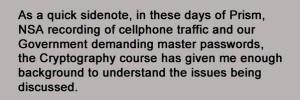A good friend sent me this link because he knew that I often recommend Udacity courses, San Jose State suspends collaboration with online provider. The story tells how San Jose University is scaling back their partnership with Udacity because things were not going as well as San Jose wanted. The story was interesting to me because I’m taking the Introduction to Psychology mentioned in the article, although not for San Jose credit. Since I’m not in a position to verify the statistics here (you should never take statistics for granted), I’m going to write as if they are correct and correct them if I find a difference.
The second paragraph has some very interesting statistics. 83% completed the course, with a passing rate of 20% to 44%. I’ll add one more statistic from the article just to make this a little more personal, the courses were limited to 100 people. That means, on average, eighty three people out of a hundred completed the course. These were people taking an on-line course and just being introduced to the college system. Maybe times have changed, but when I went to college, very few introductory classes had 83% complete the course.
The 20% to 44% pass rate is disturbing. Stay with me a moment while I equate this situation to my industry. Typically the last thing a company does to a product before shipping it out is to test it. Every once in a while the company will start to get units back that pass all the company tests but aren’t working for the customer.
In those cases it’s obvious that there’s a gap between the way the company is testing and the way the customer is using the product. We’ve already seen that telling the customer they’re holding their phone wrong doesn’t work.
Having taken a number of Udacity courses, I think there’s a disconnect between what Udacity is teaching and what San Jose was testing. Was there any discussion between the people creating the course for Udacity and the people creating the test for San Jose? The more you read this article, the more evidence you see to a disconnect. High school students, students without computers for three months and yet the competition rate was still 83%. Did San Jose really want or expect this to succeed?
There’s no question online courses have a number of issues to overcome. Many of the courses out there have the same relationship to education that my writing has to great literature. There will always be a huge gap between those that think they’re great educators and those that are.
One quote from the article just left me speechless. “Educators elsewhere have said the purely online courses aren’t a good fit for remedial students who may lack the self-discipline, motivation and even technical savvy to pass the classes. They say these students may benefit from more one-on-one attention from instructors.”
I can’t even imagine a college level educator saying this with straight face. College represented the break between force fed education and instructors that made it very clear, I was the only one that lost out if I did not attend class. They were there to provide knowledge, it was up to me to partake of it.
Udacity hasn’t sent me any threatening emails telling me the dire consequences of not finishing their 3D graphics course but they did provide all the support I could have asked. Unlike most forums where a single question can result in massive abuse and ridicule, the Udacity forums expose you to a community that actively wants to help you. Take any Udacity course and you see discussions specific to each lesson. I’ve even seen corrections by the professors after discussions with the students. You very seldom see that in at a brick and mortar college.
 I appreciate Udacity because it gives me an opportunity to improve my knowledge on specific subjects. I agree with the detractors on one point, I can attempt to take courses for which I don’t have the prerequisite knowledge. I’ve done this twice, barely squeaking through the Cryptography course and more recently deciding to abandon the 3D graphics course. I don’t regret the time I spent on either course.
I appreciate Udacity because it gives me an opportunity to improve my knowledge on specific subjects. I agree with the detractors on one point, I can attempt to take courses for which I don’t have the prerequisite knowledge. I’ve done this twice, barely squeaking through the Cryptography course and more recently deciding to abandon the 3D graphics course. I don’t regret the time I spent on either course.
MOOCs (Massive Open Online Courses) are here to stay. They will force a change in the educational system as we know it. Some colleges will resist, some colleges will incorporate them in the curriculum. Any bets on which will survive?
© 2013 – 2019, Byron Seastrunk. All rights reserved.












Recent Comments